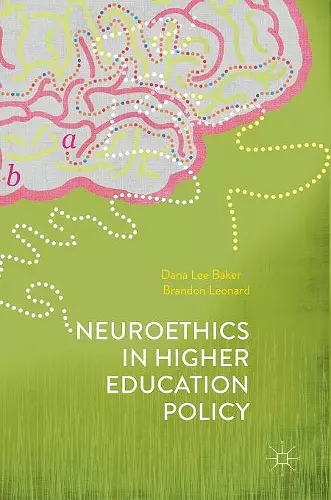Neuroethics in Higher Education Policy
Dana Lee Baker author Brandon Leonard author
Format:Hardback
Publisher:Palgrave Macmillan
Published:18th Nov '16
Currently unavailable, and unfortunately no date known when it will be back

"This book makes an important contribution to our larger conversation about diversity and social justice in US higher education. The struggle to promote accessibility for the disabled on college campuses has tended to emphasize recognition of, and accommodations for, individuals managing physical limitations. Dr. Baker makes a compelling case that university faculty, staff, and administrators must also consider how students with neurological differences face institutional and cultural barriers to their full and robust participation in the education process. Those privileged to teach or serve a diverse student body in the 21st century will be well-served by reading this book and reflecting on how American higher education can improve its commitment to equal access and opportunity for neurodiverse students." (Nick McRee, Associate Professor and Department Chair of Sociology and Social Work, University of Portland, USA)
This book focuses on neuroethics in higher education in the United States. After introducing readers to the philosophical and policy foundations of the neuroethics of higher education, this book explores essential conundrums in the neuroethical practice of higher education in modern democracies.This book focuses on neuroethics in higher education in the United States. After introducing readers to the philosophical and policy foundations of the neuroethics of higher education, this book explores essential conundrums in the neuroethical practice of higher education in modern democracies. Focusing on neuroethics from the perspective of universally designed learning and policy design sets this project apart from other work in the field. Advances in neuroscience and changes in attitudes towards disability have identified mechanisms by which higher education infrastructures interact with both individuals considered neurotypical and those with identified disabilities to diminish students’ capacity to enter, persist, and complete higher education. Policy to date has focused on identified disabilities as a requirement for accommodations. This strategy both underestimates the effect of ill-fitting infrastructures on those considered neurologically typical and serves to stratify the student body. As a result, neuroethical gaps abound in higher education.
ISBN: 9781137590190
Dimensions: unknown
Weight: 3594g
183 pages
1st ed. 2017